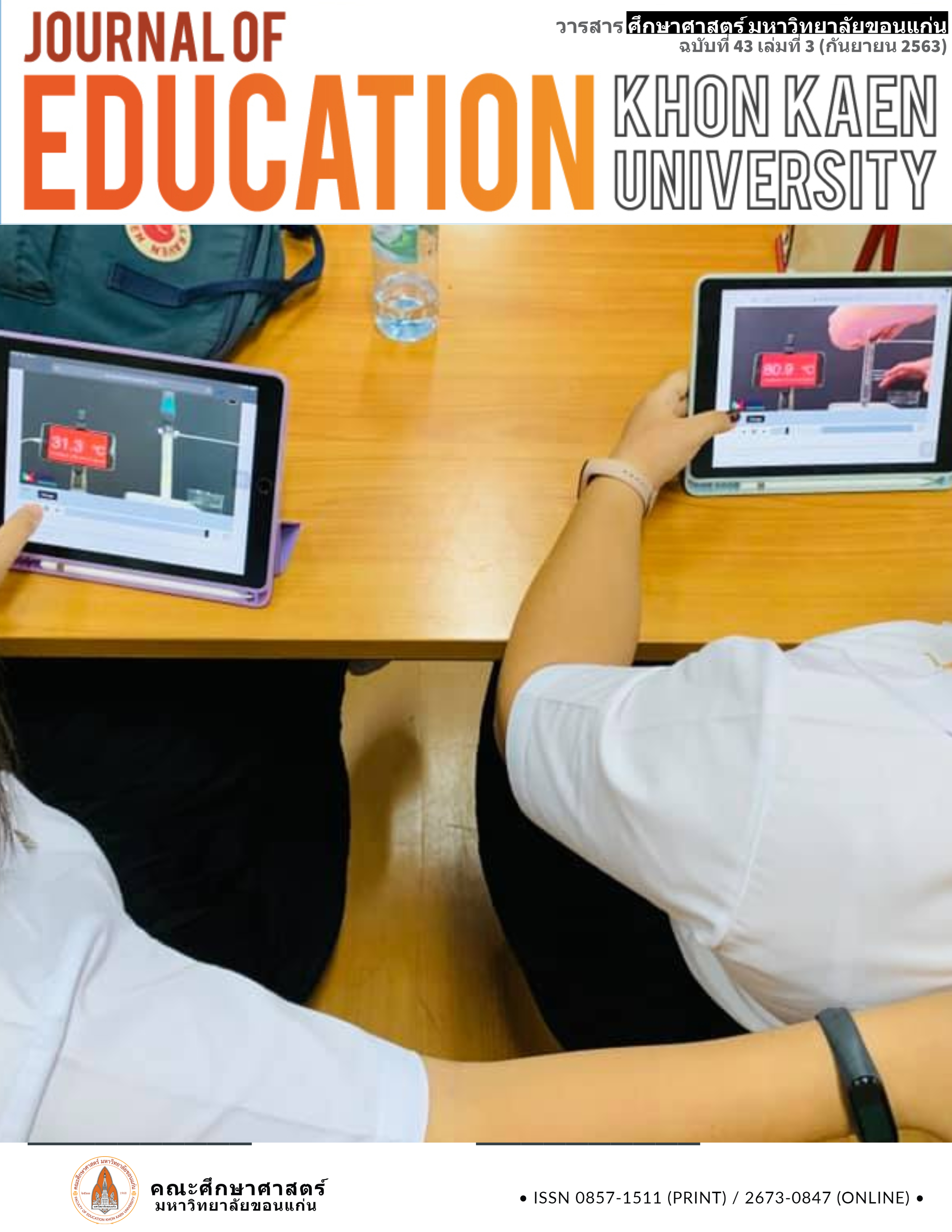Thai University Students’ Perceptions towards the Abrupt Transition to ‘Forced’ Online Learning in the COVID-19 Situation
Main Article Content
บทคัดย่อ
After the novel COVID-19 begun its global assaults, universities in Thailand have suddenly shifted their face-to-face classrooms into forced 100% online learning. Moving the normal classes with physical attendance to the cloud classes can be challenging for students. However, students’ perceptions towards online learning as a sudden shift have been overlooked. To fill this void in the literature, this study explores the Thai university students’ perceptions towards the sudden change to online learning. This study espoused a mixed-methods approach to achieve research questions. After 7 weeks of online learning, a questionnaire was distributed to 310 Thai university students by snowball sampling, and the follow-up interview was randomly conducted with 15 students who granted consent to take part in the interview session to gain insights on the particular issues. Findings revealed that the majority of students preferred face-to-face classrooms to online learning and most of them are not willing to learn online in the future. However, most of the students believed that their instructors were willing to provide them with some assistance and useful feedback during the period of ‘forced’ online learning. The findings provide important implications for instructors and teachers when it comes to online learning and teaching in a similar context.
Article Details
เอกสารอ้างอิง
Burgess, S., & Sievertsen, H. H. (2020). Schools, skills, and learning: The impact of COVID-19 on education. VOX CEPR Policy Portal. Retrieved from https://voxeu.org/article/impact-covid-19-education.
Callaghan, D. E., Graff, M. G., & Davies, J. (2013). Revealing all: Misleading self-disclosure rates in laboratory based on-line research. Cyberpsychology, Behavior, and Social Networking, 16(9), 690-694.
Dziuban, C. D., Wang, M. C., & Cook, I. J. (2004). Dr. Fox rocks: Student perceptions of excellent and poor college teaching (Unpublished dissertation). University of Central Florida.
Elliott, K. M., & Shin, D. (2002). Students satisfaction: An alternative approach to assessing this important concept. Journal of Higher Education Policy and Management, 24(2), 197-209.
Gottfried, A. E., Marcoulides, G. A., Gottfried, A. W., & Oliver, P. H. (2009). A latent curve model of parental motivational practices and developmental decline in math and science academic intrinsic motivation. Journal of Educational Psychology, 101, 729-739.
Gray, J. A., & Di Loreto, M. (2016). The effects of student engagement, student satisfaction, and perceived learning in online learning environments. NCPEA International Journal of Educational Leadership Preparation, 11(1), 1-20.
Gyamfi, G., & Sukseemuang, P. (2018). EFL Learners’ satisfaction with online learning program, Tell me more. Turkish Online Journal of Distance Education, 19(1), 183-202.
Hue, L., & Jalil, H. A. (2013). Attitudes towards ICT integration into curriculum and usage among university lecturers in Vietnam. International Journal of Instruction, 6(2), 54-66.
Ke, F., & Kwak, D. (2013). Constructs of student-centered online learning on learning satisfaction of a diverse online student body: A structural equation modelling approach. Journal of Educational Computing Research, 48(1), 97-122.
Kuama, S., & Intharaksa, U. (2016). Is Online Learning Suitable for All English Language Students? PASAA, 52, 53-82.
Labiba, A. (2018). Perceptions and willingness of students towards using TELL in Bangladeshi Private Universities (Unpublished dissertation). BRAC University.
Mala, D. (2020). Covid-19 fear pushes classes online. Bangkok Post. Retrieved from https://www.bangkokpost.com/thailand/general/1876594/covid-19-fear-pushes-classes-online.
Mandernach, B. J., Donnelli-Sallee, E., & Dailey-Hebert, A. (2011). Assessing course student engagement. In R. Miller, E. Amsel, B. M. Kowalewski, B.B. Beins, K. D. Keith, & B. F. Peden (Eds.), Promoting Student Engagement: Techniques and Opportunities (pp. 277- 281). Society for the Teaching of Psychology, Division 2, American Psychological Association.
Morris, T. (2011). Exploring community college student perceptions of online learning. International Journal of Instructional Technology and Distance Learning, 8(6), 31-43.
Ngampornchai, A., & Adams, J. (2016). Students’ acceptance and readiness for E-learning in Northeastern Thailand. International Journal of Educational Technology in Higher Education, 13(34), 1-13.
Paechter, M., Maier, B., & Macher, D. (2010). Students’ expectations of, and experiences in e-learning: Their relation to learning achievements and course satisfaction. Computer Education, 54(1), 222-229.
Saengpassa, C. (2013). E-Learning slow to progress in Thailand. The Nation. Retrieved from http://www.nationmultimedia.com/national/E-Learning-slow-to-progress-in-Thailand-30221101.html.
Sekaran, U. (2003). Towards a guide for novice research on research methodology: Review and proposed methods. Journal of Cases of Information Technology, 8(4), 24-35.
Shea, P., Frederiksen, E., Pickett, A., & Pelz, W. (2003). Student satisfaction and reported learning in the SUNY Learning Network. In T. Duffy and J. Kirkley, Learner-Centered Theory and Practice in Distance Education. Mahwah, NJ: Lawrence Erlbaum.
Shraim, K. Y., & Khlaif, Z. N. (2010). Students’ Readiness Towards E-Learning: A Case Study of Virtual Classrooms for Secondary Education in Palestine. The 3rd Conference on E-Learning Excellence in the Middle East Proceeding, 1-11.
Skordis-Worral, J., Haghparast-Bidgoli, H., Batura, N., & Hughes, J. (2015). Learning online: A case study exploring student perceptions and experience of a course in Economic Evaluation. International Journal of Teaching and Learning in Higher Education, 27(3), 413-422.
Smart, K. L., & Cappel, J. J. (2006). Students’ Perceptions of Online Learning: A Comparative Study. Journal of Information Technology Education, 5, 201-219.
Wlodkowski, R. J. (2005). Adults in Modern Society are on a Lifelong Educational Journal. San Francisco: Jossey-Bass.


